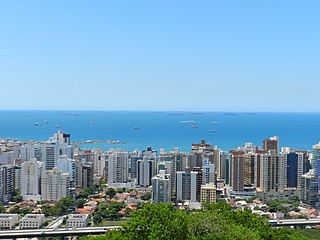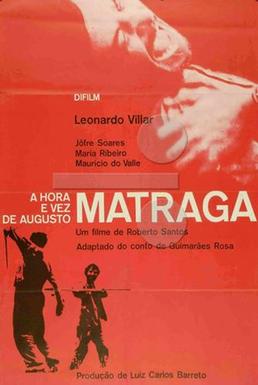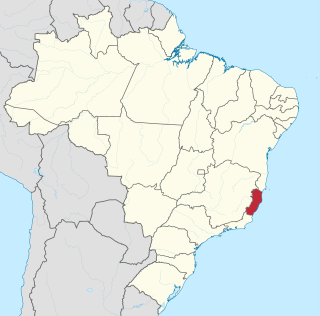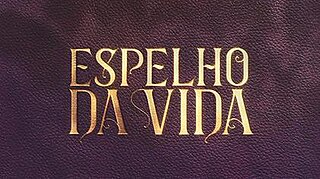
Vitória is the capital of the state of Espírito Santo, Brazil. It is located on a small island within a bay where a number of rivers meet the sea. It was founded in 1551. The city proper is 93 square kilometres and has a population of 322,869 (2022), whilst the Greater Vitória metropolitan area has a population of more than 1,880,828, the 14th largest in Brazil.

Vasco Fernandes Coutinho (1490–1561) was a Portuguese fidalgo and the first donatary of the Captaincy of Espírito Santo, a colonial territory in what is now Brazil.

Praia da Vitória is a municipality in the Portuguese archipelago of the Azores. With a population of 21,035, the second largest administrative authority on the island of Terceira, it covers an area of 162.29 square kilometres (62.66 sq mi), that extends from the northern coast halfway into the interior.

Vitória Futebol Clube, commonly referred to as Vitória, is a Brazilian professional club based in Vitória, Espírito Santo founded on 1 October 1912, being the oldest club in the state. It competes in the Campeonato Capixaba, the top flight of the Espírito Santo state football league.

João Punaro Bley was a Brazilian military and public administrator.

The Roman Catholic Archdiocese of Vitória is an archdiocese located in the city of Vitória in Brazil.
The Roman Catholic Diocese of Cachoeiro de Itapemirim is a diocese located in the city of Cachoeiro de Itapemirim in the ecclesiastical province of Vitória in Brazil.

The Hour and Turn of Augusto Matraga is a 1965 Brazilian crime drama film directed by Roberto Santos, based on the short story of the same name by João Guimarães Rosa.

From Beginning to End is a 2009 Brazilian romantic drama film directed by Aluizio Abranches, starring Fábio Assunção, Júlia Lemmertz, Gabriel Kaufmann, Lucas Cotrim, João Gabriel Vasconcellos and Rafael Cardoso. It premiered in Brazil on November 27, 2009. The film deals with homosexuality and incest, two types of relationships that are often considered to be taboo. Abranches claims that his only intention was to tell a love story.
Centro de Treinamento Edmílson Colatina Futebol Clube, commonly known as CTE Colatina, is a Brazilian football team based in Colatina, Espírito Santo state. They competed in the Série A once and competed in the Copa do Brasil twice. The club was formerly known as Espírito Santo Sociedade Esportiva.

Espírito Santo is a state in southeastern Brazil. Its capital is Vitória, and its largest city is Serra. With an extensive coastline, the state hosts some of the country's main ports, and its beaches are significant tourist attractions.

A Vida da Gente is a Brazilian telenovela that was broadcast by TV Globo in 2011 and 2012.
The Brazilian municipal elections of 2012 took place on October 7 and on October 28. Over 138 million voters chose mayors, deputy mayors and city councillors for the 5,568 municipalities of Brazil. These were the first elections in which the recently registered parties Partido Pátria Livre (PPL) and Partido Social Democrático (PSD) participated; they were both recognized by the Superior Electoral Court in 2011. Political parties whose candidates wished to run for the 2012 elections had to be registered at the TSE for at least one year before the election date, while candidates also had to be affiliated to a party for the same period of time. Conventions for the selection of candidates within the parties occurred between 10 and 30 June, while the registry of candidates and alliances with the Regional Electoral Courts took place until July 5. Electoral campaign was authorized from the moment a candidacy had been registered. The free electoral program – two daily slots on free-to-air TV and radio for political advertising paid by the Electoral Justice fund – ran weekdays from 21 August until 4 October. According to the current Brazilian electoral law, the two-round system – should the leading candidate receive less than 50% +1 of the votes – is only available for cities with more than 200,000 voters. This includes all state capitals, with the exception of Boa Vista, Roraima and Palmas, Tocantins, plus 59 other municipalities. The free electoral program for the second round ran from 13 October until 26 October.

Events in the year 1982 in Brazil.
Pecado Capital is a Brazilian telenovela produced and broadcast by TV Globo. It premiered on 24 November 1975 and ended on 4 June 1976, with a total of 167 episodes. It's the sixteenth "novela das oito" to be aired on the timeslot. It is created and written by Janete Clair and directed by Daniel Filho and Jardel Mello.
Manoela Caiado de Moura, better known as Manoela Caiado, is a journalist, television presenter and Brazilian reporter. She currently works Influencer Digital.

Espelho da Vida is a Brazilian telenovela produced and broadcast by TV Globo that premiered on 25 September 2018, replacing Orgulho e Paixão, and ended on 1 April 2019. It is created by Elizabeth Jhin, and directed by Pedro Vasconcelos.

The History of Espírito Santo is composed of studies focused on the evolution of the territory and society of the state of Espírito Santo, Brazil, from the first indigenous inhabitants and the creation of the Captaincy of Espírito Santo by Vasco Fernandes Coutinho, in 1535, to the present day.

The Academia Espírito-santense de Letras is a Brazilian literary society headquartered in Vitória, Espírito Santo.














